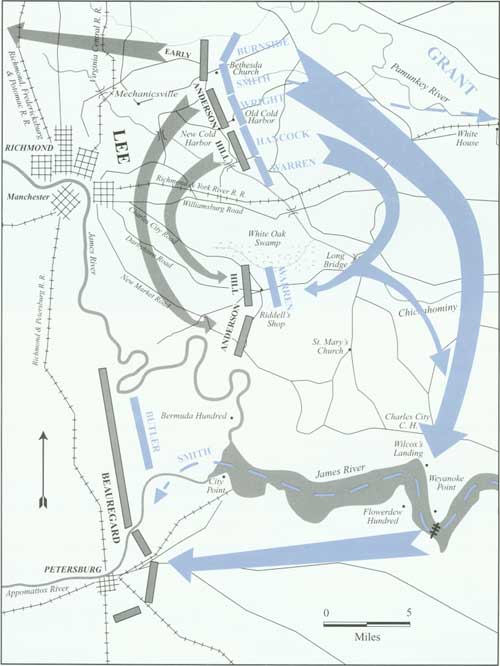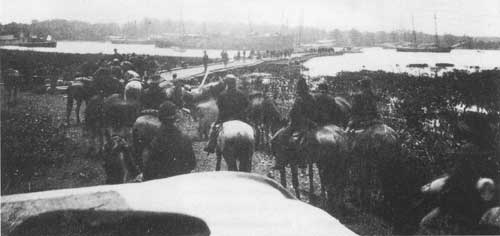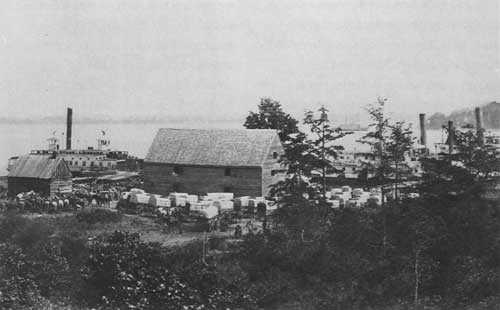|
JUNE 13-14: GRANT CROSSES THE JAMES RIVER
Early on June 13, Lee's videttes discovered that Grant had left.
Confederate scouts probed two miles behind the empty earthworks and
found no sign of the enemy. Grant had stolen his march on Lee. Whether
the Federals intended to strike toward Richmond from below the
Chickahominy or to cross the James and attack Petersburg was unclear to
the Confederates. "Marse Robert, who knew everything knowable, did not
appear to know just what his old enemy proposed to do," a Confederate
quipped.

(click on image for a PDF version)
|
THE RACE FOR PETERSBURG, JUNE 12-15
Shifting his attention away from Lee and Richmond, Grant begins a
swift movement south to the vital Confederate rail and supply hub at
Petersburg. With Warren covering his flank at Riddell's Shop, Grant
rapidly moves the army south to the James River, crossing at Wilcox's
Landing and Weyanoke Point during the evening of June 14-15. Lee,
having dispatched Early to the Shenandoah Valley and most of his cavalry
to pursue Sheridan, is slow to react to Grant's southward movement. By
nightfall on June 14, however, Lee has correctly deduced Grant's
intentions and makes preparations to assist Beauregard in the defense of
Petersburg.
|
Puzzled as to Grant's whereabouts, Lee sent his army scrambling south
across the Chickahominy along the Charles City Road. His immediate goal
was to protect the approaches to Richmond north of the James. As the day
warmed, reports from Confederate cavalry confirmed a strong Union
presence at Riddell's Shop. Late in the afternoon, sharpshooters from
Hill's Corps dueled Chapman's dismounted cavalry, driving them east
through Riddell's Shop to Crawford's entrenchments. "The hardest fight
we have had for a long time," one of Chapman's troopers scrawled in his
diary.
Nightfall brought a halt to the Confederate attack and saved Warren,
who faced Lee's entire army with no support within miles. Lee, however,
failed to grasp Warren's perilous situation and contented himself with
probing the Fifth Corps line. The Army of Northern Virginia encamped
along a line running from White Oak Swamp south to Malvern Hill, the
Third Corps on the left and the First Corps on the right, controlling
the approaches to Richmond.
Grant, however, had no intention of attacking north of the James. He
aimed to push across the river and head for Petersburg. Warren's screen
had done its job well. Concealed from Lee's gaze, Hancock's troops,
following a long and exhausting march, reached Wilcox's Landing on the
James around 5:30 P.M. On June 13. The Sixth and Ninth Corps, pursuing
a somewhat longer route, bivouacked that evening well toward the
river.
By morning on June 14, Lee understood that he faced a single Union
corps at Riddell's Shop and directed Hill to attack. The quarry,
however, had escaped. During the night, Warren had resumed his southerly
movement and shifted his left to Samaria Church.

|
ON JUNE 14, ENGINEERS BEGAN CONSTRUCTION OF A BRIDGE AT WEYANOKE POINT.
WHEN COMPLETED, IT REQUIRED 101 PONTOONBOATS AND SPANNED THIS 700-YARD
STRETCH OF THE JAMES RIVER. (USAMHI)
|
Lee remained baffled. Most of his cavalry was pursuing Sheridan,
making it difficult for him to reconnoiter Grant's movements. Grant had
disappeared, and Lee could only speculate about where he might emerge.
Shortly after noon, he informed President Davis that he thought Grant
"must be preparing to move south of James River." A few hours later, he
spoke with greater certainty. "As far as I can judge from the
information I have received," he wrote, Genl. Grant has moved his army
to James River." Most likely, Lee surmised, he intended to cross and
move on Petersburg. Acting on that probability, Lee hurried Hoke toward
Drewry's Bluff, where he could cross on a pontoon bridge and aid
Beauregard in defending Petersburg. Lee held the remainder of his army
in readiness near Malvern Hill, waiting for definitive information
about Grant's objective.
While Lee waited, Grant pushed his advantage. During the night of
June 14-15, boats ferried Hancock's corps across the James. Union
engineers labored all night to construct a 2,100-foot pontoon bridge
over the river at nearby Weyanoke. Only thirteen feet wide, the
structure was an engineering marvel, built to withstand four-foot tides
and strong currents. The remainder of the Union army crossed the tenuous
span on June 15.

|
WHILE SOME OF THE ARMY CROSSED DOWNRIVER AT WEYANOKE POINT, THE MAJORITY
OF GRANT'S FORCE WAS FERRIED ACROSS THE JAMES RIVER HERE AT WILCOX'S
LANDING. (NA)
|
The broad river and the exhilaration attendant to crossing it
wonderfully improved Union spirits. Grant stood watching the spectacle,
hands clasped behind his back. "The great bridge was the scene of a
continuous movement of infantry columns, batteries of artillery, and
wagon-trains," recounted the aide Horace Porter. "The approaches to the
river on both banks were covered with masses of troops moving briskly
to their positions or waiting patiently their turn to cross." The scene
reflected Porter, "was a matchless pageant that could not fail to
inspire all beholders with the grandeur of achievement and the majesty
of military power."
Grant was satisfied. "All effect of the battle of Cold Harbor seemed
to have disappeared," he remarked. One of Meade's aides saw the general
break into a smug smile. "I think it is pretty well to get across a
great river, and come up here and attack Lee in his rear before he is
ready for us," he remarked.
The race for Petersburg was on.
|
|
